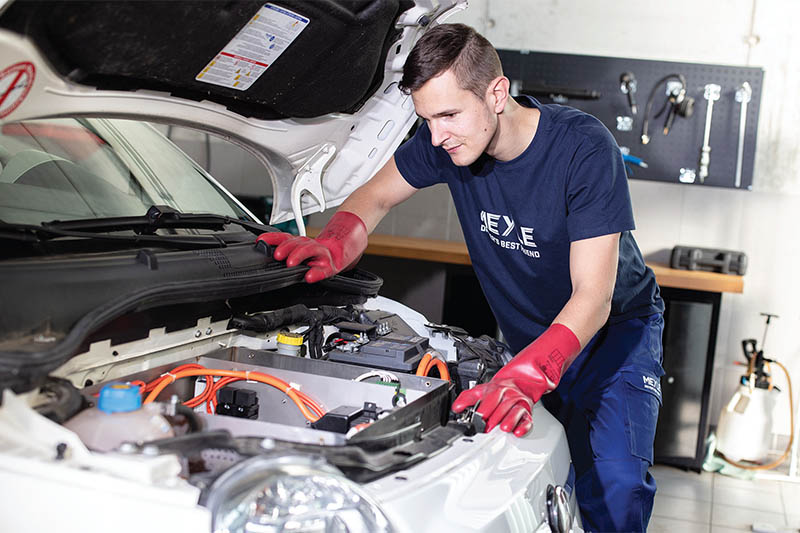
Meyle discusses some of the challenges faced by workshops in handling high voltage vehicles.
With the rise of electric vehicles, workshops face numerous challenges in maintaining and repairing. Let’s address some of the challenges high voltage vehicles pose.
1. Safety risks and training requirements
One of the most significant challenges for workshops is ensuring the safety of technicians when working with high-voltage systems. In contrast to conventional vehicles with internal combustion engines, electric vehicles operate on voltages that can reach up to 800 volts. This presents a substantial risk of electrical shock or even fatal accidents if proper precautions are not taken. Workshops should invest in specialised training programs to school and certify their staff in high-voltage safety works and procedures, such as isolating the battery system, using insulated tools, and wearing appropriate personal protective equipment.
2. Specialised equipment and infrastructure
Standard workshop tools and diagnostic equipment are sometimes inadequate for HV vehicle maintenance. Workshops need to invest in specialised (insulated) tools and dedicated areas for handling high-voltage components, such as batteries, safely. Additionally, the infrastructure must be adapted to accommodate EV servicing, including installing high-voltage isolation zones and emergency response measures.
3. Rapidly evolving technology
EV technology is advancing at a rapid pace, with continuous improvements not only in battery systems and software but also when it comes to parts and solutions. Keeping up with these developments requires ongoing education and access to manufacturer-specific training materials. Workshops must stay updated with the latest diagnostic tools and software updates to ensure accurate troubleshooting and repairs. Meyle, for example, offers a two-day-training course in their German HQ to help workshops learn hands-on from experts how to service Tesla models and diagnose faults and help them get ready.
4. Limited access to technical information
Unlike traditional vehicles, where service manuals and diagnostic data are widely available, many EV manufacturers restrict access to essential technical information. This creates difficulties for independent workshops trying to diagnose and repair those systems. Some manufacturers require proprietary software or specific certifications before granting access to crucial repair information, further complicating the servicing process.
5. Customer awareness and expectations
Many EV owners may not fully understand the technical challenges associated with their vehicles. Workshops must educate customers on realistic service timelines, costs, and potential safety precautions. Misconceptions about EV maintenance can lead to unrealistic expectations, making transparent communication an essential part of customer service. Workshops should also proactively inform customers about the importance of specialised EV servicing and the potential risks of unqualified repairs. Establishing trust through educational initiatives, such as workshops or informational materials, can help customers make informed decisions regarding their vehicle maintenance. Furthermore, providing detailed breakdowns of service procedures and estimated costs can improve customer satisfaction and foster long-term relationships between workshops and EV owners.
As the number of electric vehicles continues to grow, workshops must adapt to the new landscape of high-voltage vehicle servicing. Overcoming safety risks, investing in specialised tools, and staying informed about evolving technology are essential steps in ensuring a successful transition.









